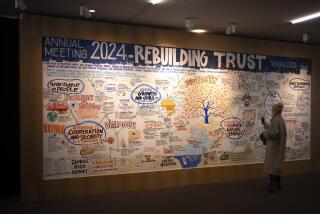Village Is China’s Fledgling ‘Davos’
- Share via
BOAO, China — The world remembers Hainan island as the place where an American spy plane made an emergency landing a year ago after colliding with a Chinese fighter jet.
But the Chinese don’t intend for this tropical locale to be relegated to a historical footnote.
Boao, a deserted fishing village on the island’s eastern side, is being transformed into the Davos, Switzerland, of China.
Davos, an elite skiing destination, has played host for more than three decades to the annual meeting of movers and shakers known as the World Economic Forum. Only the events of Sept. 11 led the forum to convene this year in New York.
On Friday and Saturday, however, China held an Asian version of the forum here--an event marking the country’s effort to counteract U.S. dominance in international affairs. It also symbolized Beijing’s rising political and economic clout in the Asian Pacific region.
With the world struggling amid a sluggish economy and the United States barely out of recession, China is a 900-pound guerrilla that few in Asia can afford to ignore. Despite inflated growth statistics, it remains the only country in the region to survive the Asian financial crisis of the late 1990s and the current global slowdown with minimal damage. It attracts 70% of all foreign direct investment in Asia. Its huge potential market will become even more attractive now that it’s a member of the World Trade Organization.
That unnerves smaller Asian economies watching China erode their competitive advantage. But officials among the businesspeople, academics and politicians who gathered here for the inaugural Boao Forum for Asia said they have little choice but to think of their giant neighbor as an opportunity as well as a threat.
“Some people feel we are all living in China’s shadow,” said Mah Bow Tan, Singapore’s minister for national development. “But I am cautiously optimistic. As China grows, there will be positive spinoffs.”
To calm any anxiety, Chinese Premier Zhu Rongji told the gathering of about 1,900 people--including the prime ministers of Japan, Thailand and South Korea--that “an economically developed China will pose no threat to any country or region.”
Instead, Zhu emphasized regional cooperation. One proposal he floated was the creation of a free trade zone in Asia modeled on the North American Free Trade Agreement.
“This effort . . . will certainly speed up our economic development in a spirit of free trade and mutual benefit,” Zhu said.
But that might take years to realize. Meanwhile, delegates felt the growing pains of an all-Asian powwow. Logistical difficulties dominated the two-day conference in this brand-new seaside resort. Guests struggled from the moment they disembarked at an airport nearly two hours’ drive away. They wrestled during the rest of their stay with basic problems that ranged from traveling to and from the convention venues and their hotels to getting enough to eat.
Apologetic organizers said the event was significantly oversubscribed.
Developer Jiang Xiaosong, who is building this political Club Med from scratch, told his guests that they were part of history in the making.
“When I first saw this place in 1992, there were no roads, no electricity,” said Jiang, a Shanghai-born filmmaker turned real estate tycoon.
When completed, Boao will be a convention and vacation heaven, with at least 30 hotels, six golf courses and various aquatic attractions and theme parks.
Jiang has the wherewithal to dream this way because he is connected all the way to China’s top. President Jiang Zemin was a friend and fan of his late mother, Bai Yang, a renowned movie star.
According to the developer, the Chinese president liked Boao so much during the forum’s pilot session last year that he composed a poem for the forum and inked it with his official seal--a ringing endorsement, the tycoon said.
Despite emphasizing that this was a nongovernmental forum to increase dialogue among Asian countries, China was clearly calling the shots. Representatives from neighboring states who did not get on panels or felt otherwise slighted took that as a sign of the times.
“China is too large, too rapidly growing,” said Mari Pangestu of the Center for Strategic and International Studies in Jakarta, the Indonesian capital. “How we manage this relationship is the biggest challenge in the next century.”
And perhaps out of respect for their host, few public voices were raised in dissent. Of course, there also was no trace of the anti-globalization protesters who had become regular features at the meetings in Davos.
Heavy security cleared the roads and waterways here. Few people knew that there were angry villagers just a short boat ride away. They will be evicted by the next phase of development, which proposes to reward next year’s conference participants with a state-of-the-art convention center, hotel complex and golf course.
Out in the cold will be villagers whose ancestors have lived there for more than 700 years.
These people say the compensation the government promised them is barely enough to build a new home farther inland. There will be nothing left with which to put food on the table and send children to school. Employment on Hainan is scarce, and they lack skills. Even the construction jobs have gone to out-of-town workers.
“It’s not that we don’t support the forum,” Zhu Cimin, a 63-year-old grandfather of seven, said at his home amid the island’s trademark thick vegetation and coconut groves. “But we are farmers. When we lose the land, we lose everything. We understand our country needs to develop, but so do we.”
More to Read
Sign up for Essential California
The most important California stories and recommendations in your inbox every morning.
You may occasionally receive promotional content from the Los Angeles Times.










